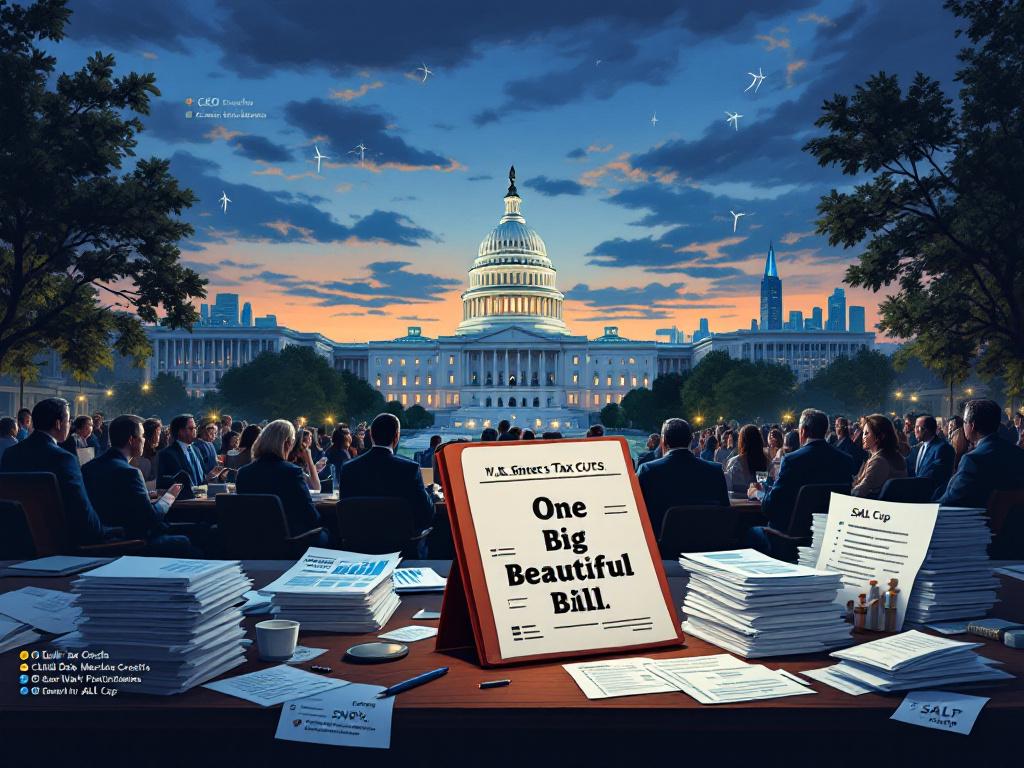Articles in this Cluster
21-05-2025
Oxfam reports the 10 richest Americans gained $365 billion from April 2024 to April 2025—about $1 billion a day—with Elon Musk alone up $186 billion. As wealth inequality widens, Republicans are advancing the “One Big Beautiful Bill Act” to extend and expand 2017 tax cuts. Nonpartisan analyses say the top 10% would receive about two-thirds of the benefits, while lower-income households could face net losses due to cuts to safety net programs. Penn Wharton projects modest long-term GDP gains but disproportionate benefits to high earners; CBO and fiscal watchdogs warn the bill would add $3.3–$3.8 trillion to the national debt over a decade. Oxfam argues a 3% wealth tax above $1 billion could raise $50 billion from the top 10 alone, though implementation and constitutionality are debated. Republicans say the plan would boost prosperity; critics label it a giveaway to the wealthy.
Entities: Oxfam, Elon Musk, Republican Party, One Big Beautiful Bill Act, 2017 tax cuts • Tone: analytical • Sentiment: neutral • Intent: inform
21-05-2025
House Republicans passed a sweeping, 1,000+ page bill 215-214 advancing President Trump’s domestic agenda. It delivers roughly $3.8 trillion in tax cuts by extending most 2017 cuts, raises the SALT cap to $40,000 for many married filers, temporarily exempts overtime from taxes (2026–2028), allows U.S.-made car loan interest deductions, boosts the child tax credit to $2,500 through 2028, increases the standard deduction, and adds a $4,000 senior deduction that phases out at higher incomes.
To offset costs, it tightens safety net programs: imposes 80-hours-per-month work requirements on childless, non-disabled Medicaid adults starting late 2026; increases eligibility verifications; and adds stricter work rules and higher state cost shares for SNAP—changes that could reduce enrollment. It raises the debt ceiling by $4 trillion, rolls back clean energy tax credits (including ending the $7,500 EV credit), and directs major border funding: $46.5 billion for the wall, billions for CBP facilities, staffing, and surveillance tech. It also introduces unprecedented immigration fees, including $1,000 for asylum applications and new charges for work permits, parole, sponsorship of unaccompanied minors, and Temporary Protected Status. The bill now faces significant hurdles in the Senate.
Entities: House Republicans, President Donald Trump, Medicaid work requirements, SALT cap, Child Tax Credit • Tone: analytical • Sentiment: neutral • Intent: inform
21-05-2025
Representative Chip Roy of Texas is leading a group of conservative House Republicans demanding deeper spending cuts to President Trump’s flagship domestic policy package, arguing it front-loads deficits and adds trillions to the debt. Known for his hard-line fiscal stance and willingness to buck party leaders, Roy has a history of leveraging procedural fights and negotiations to extract concessions, including during the McCarthy speakership battle and debt limit talks. Despite tensions with Trump—whom he has crossed before—Roy is pressing for sharper Medicaid reforms and full repeal of clean energy tax credits, criticizing the bill’s “backloaded” savings. His stance has stalled Speaker Mike Johnson’s vote-gathering, and whether Roy ultimately relents could decide the bill’s fate.
Entities: Chip Roy, House Republicans, Donald Trump, Mike Johnson, Medicaid reforms • Tone: analytical • Sentiment: neutral • Intent: analyze
21-05-2025
House Republican leaders advanced a sweeping tax-and-spending package aligned with President Trump’s agenda, but final passage in the closely divided House remained uncertain. After a marathon Rules Committee session, Speaker Mike Johnson offered concessions to win support, including faster Medicaid work requirements (moved to late 2026), a higher state and local tax deduction cap ($40,000), expanded rollbacks of Biden-era clean energy tax credits, and more funds for state immigration enforcement. The changes risked losing moderates protecting clean energy incentives while only partly appeasing conservatives opposed to a larger SALT cap.
The bill, dubbed the One Big Beautiful Bill Act, extends most 2017 tax cuts and adds temporary cuts such as no federal taxes on tips and overtime. The Congressional Budget Office estimated it would add about $2.3 trillion to the debt over a decade, increase the number of uninsured by around 10 million, and shift benefits toward higher earners while reducing support for the poorest. With Democrats unified against it and Republicans able to lose no more than three votes, leaders pushed for a pre-Memorial Day vote amid internal rifts and late-night negotiations.
Entities: House Republicans, Speaker Mike Johnson, One Big Beautiful Bill Act, Congressional Budget Office, state and local tax deduction (SALT) cap • Tone: analytical • Sentiment: neutral • Intent: inform
